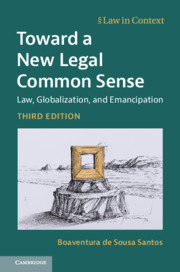Book contents
- Toward a New Legal Common Sense
- The Law in Context Series
- Toward a New Legal Common Sense
- Copyright page
- Dedication
- Contents
- Preface to the Third Edition
- Preface to the Second Edition
- Acknowledgements
- 1 The Tension between Regulation and Emancipation in Western Modernity and Its Demise
- 2 Toward an Oppositional Postmodern Understanding of Law
- 3 Legal Plurality and the Time-Spaces of Law: The Local, the National, and the Global
- 4 The Law of the Oppressed: The Construction and Reproduction of Legality in Pasargada
- 5 Globalization, Nation-States, and the Legal Field: From Legal Diaspora to Legal Ecumenism?
- 6 Law and Democracy: The Global Reform of Courts
- 7 On Modes of Production of Social Law and Social Power
- 8 Law: A Map of Misreading
- 9 Can Law Be Emancipatory?
- Postface as Disquietude
- Bibliography
- Index of Names
- Index of Subjects
3 - Legal Plurality and the Time-Spaces of Law: The Local, the National, and the Global
Published online by Cambridge University Press: 08 October 2020
- Toward a New Legal Common Sense
- The Law in Context Series
- Toward a New Legal Common Sense
- Copyright page
- Dedication
- Contents
- Preface to the Third Edition
- Preface to the Second Edition
- Acknowledgements
- 1 The Tension between Regulation and Emancipation in Western Modernity and Its Demise
- 2 Toward an Oppositional Postmodern Understanding of Law
- 3 Legal Plurality and the Time-Spaces of Law: The Local, the National, and the Global
- 4 The Law of the Oppressed: The Construction and Reproduction of Legality in Pasargada
- 5 Globalization, Nation-States, and the Legal Field: From Legal Diaspora to Legal Ecumenism?
- 6 Law and Democracy: The Global Reform of Courts
- 7 On Modes of Production of Social Law and Social Power
- 8 Law: A Map of Misreading
- 9 Can Law Be Emancipatory?
- Postface as Disquietude
- Bibliography
- Index of Names
- Index of Subjects
Summary
I start from a conventional conception of anthropology and sociology of law - legal pluralism - to construct a new legal landscape capable of encompassing different scales of law, be they local, national, or global. I have been calling for an epistemological turn for a long time. And I have found it in my conception of the epistemologies of the South that refuses the abstract universalism of modern law and propose the recognition of legal plurality and the transformation of vertical differences into horizontal ones. The nation-state has been the most central time-space of law for the last two hundred years, particularly in the core countries of the world system. However, its centrality only became possible because the other two time-spaces, the local and the global, were formally declared non-existent by the hegemonic liberal political theory. My purpose is, first, to show that the legal field in contemporary societies and in the world system as a whole is a more complex and richer landscape than has been assumed by liberal political theory. Second, I set out to show that such a legal field is a constellation of different legalities (and illegalities) operating in local, national and global time-spaces, displaying a variety of configurations, making it increasingly hard to identify their limits. The way law’s potential evolves, whether towards regulation or emancipation, has nothing to do with the autonomy or self-reflexivity of the law, but rather with the political mobilization of competing social forces.
Keywords
- Type
- Chapter
- Information
- Toward a New Legal Common SenseLaw, Globalization, and Emancipation, pp. 99 - 120Publisher: Cambridge University PressPrint publication year: 2020

